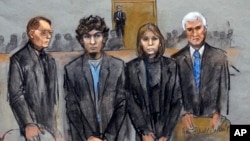Nearly two weeks after convicting accused Boston Marathon bomber Dzhokhar Tsarnaev of all 30 charges against him, jurors Tuesday heard reasons he should be put to death.
U.S. prosecutors showed the 12-member jury a photo of Tsarnaev giving the middle finger to a surveillance camera the day of his first court appearance in 2013.
"This is Dzhokhar Tsarnaev," said Assistant U.S. Attorney Nadine Pellegrini. "Unconcerned, unrepentant and unchanged."
The 21-year-old, an ethnic Chechen U.S. immigrant-turned-citizen, was found guilty of working with his older brother, Tamerlan, to carry out the April 15, 2013 attack. The twin pressure cooker bombs they set off killed three people and wounded 264. The two brothers also fatally shot a police officer as they tried to elude a massive police manhunt. The elder Tsarnaev was killed days after the bombings during their attempted escape.
The court Tuesday was shown large photos of the four dead victims.
"They were all beautiful, and they're all now gone," said Pellegrini. She described the killings as "unbearable, indescribable, inexcusable and senseless," labeling the younger Tsarnaev "America's worst nightmare."
Witnesses who lost limbs or loved ones in the bombings also were called to the stand, recounting the horror of the attack.
Jurors must now determine whether Tsarnaev should be sentenced to death or life in prison. The penalty phase of the trial could last a month. If the jury does not agree unanimously on a death sentence, a life without parole sentence will be imposed automatically.
Tsarnaev's attorneys, pushing for life behind bars, have argued that his radicalized older brother was the driving force behind the attack, and that Dzhokhar played a secondary role out of a sense of sibling loyalty.
Some survivors and the parents of 8-year-old Martin Richard, who died in the attack, also have lobbied publicly against a death sentence.
"We know that the government has its reasons for seeking the death penalty," Bill and Denise Richard wrote in an essay in The Boston Globe last week, "but the continued pursuit of that punishment could bring years of appeals and prolong the most painful day of our lives."
Over the past 15 years, only three people have been put to death by the federal government - Oklahoma City bomber Timothy McVeigh, drug smuggler Juan Raul Garza and kidnapper Louis Jones.
Tsarnaev's lawyers acknowledged from the start of the federal trial that he was involved in the plot to detonate the bombs. But defense attorney Judy Clarke, who has successfully kept other notorious U.S. murder convicts off death row, told the jury at the end of the first phase of the trial, "If not for Tamerlan, it would not have happened."
The elder Tsarnaev died after being shot by police and inadvertently driven over by Dzhokhar as the two brothers attempted to flee the Boston area.
Dzhokhar was later found hiding in a boat parked in the backyard of a suburban Boston home. Prosecutors say he scrawled a motive for the attack on the inside wall of the boat, writing that the brothers were trying to avenge American attacks on Muslims in the wars in Iraq and Afghanistan.





